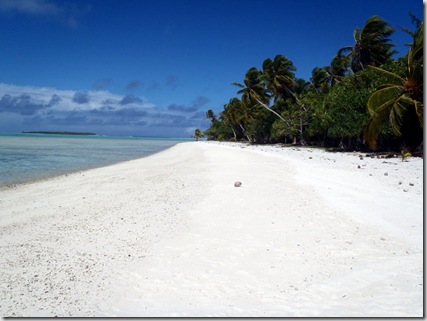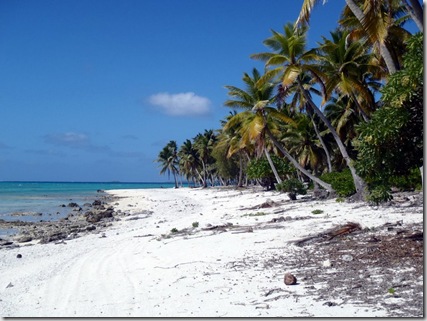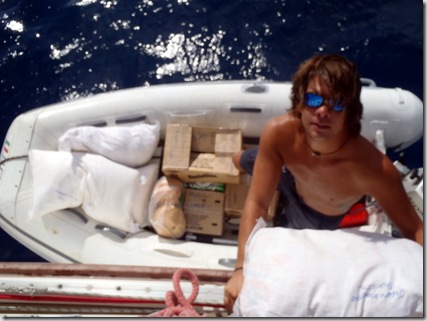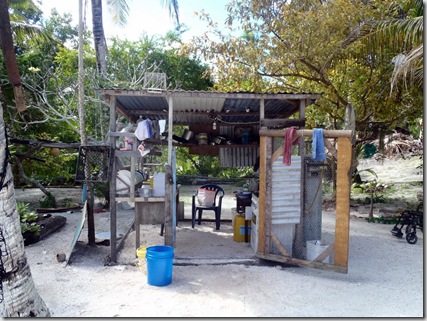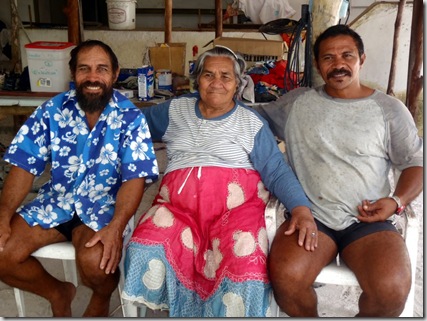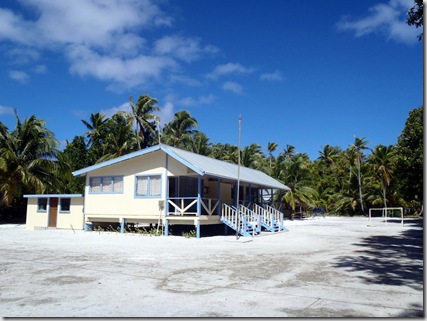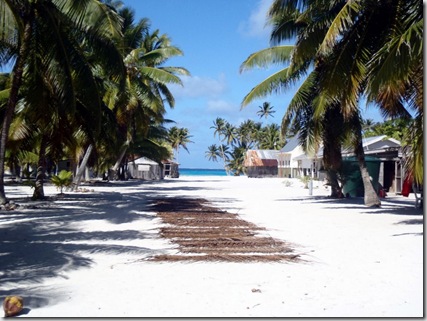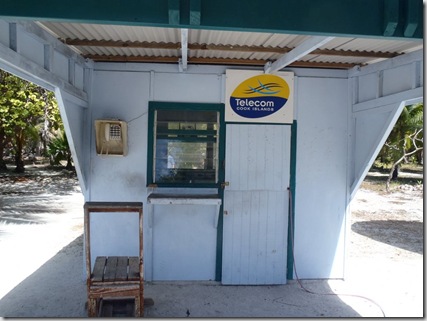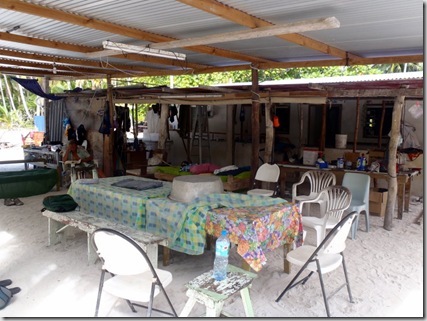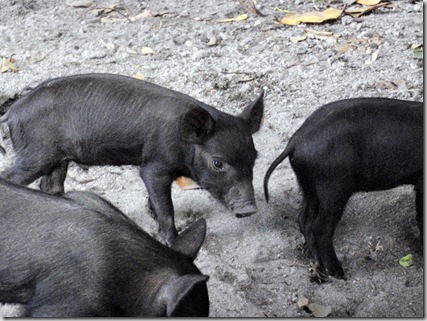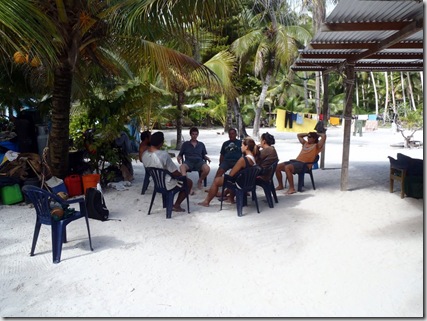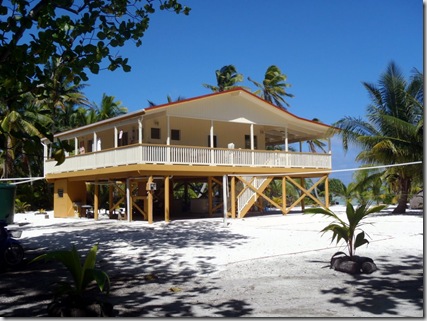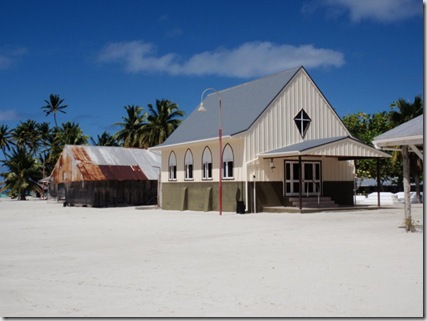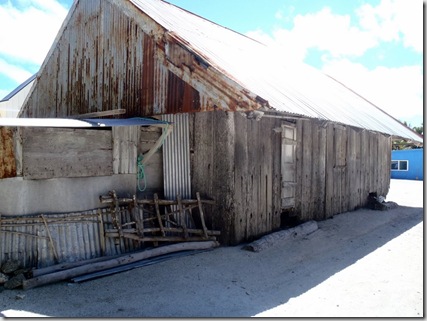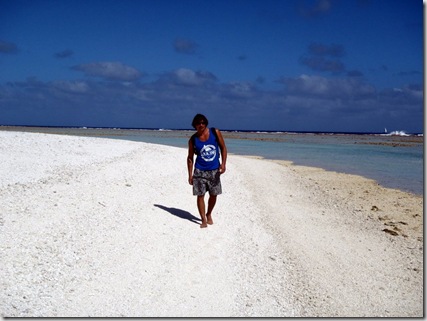The sun warmed our backs as we sailed around the north side of Palmerston atoll. It had been 36 hours since we began the 200-mile passage from Aitutaki to Palmerston, the easternmost of the Southern Cook Islands. As we got closer, we were surprised to see that it looked like we’d sailed back to the Tuamotu Archipelago. A wide barrier reef enclosed a peaceful green lagoon, and protected the interior from the hungry, pounding surf. Six tiny islands dotted the reef, each one covered with coconut palms and white sand, and all of them solitary and uninhabited except one: Palmerston Island.
As we adjusted the sails and made our turn down the western side of the triangular atoll, a woman’s voice came over the VHF radio. “Yacht on the north side of Palmerston, come in. Over.” Her thick Polynesian dialect was fused with sharp New Zealand vowels, and it took me a minute or two to realize she was hailing us. Just as I was about to respond, a male voice came over the radio. “Yacht on the north side of Palmerston, this is Alpha-Sierra. Come in. Over.”
Palmerston is home to 62 descendants of William Marsters, a Lancashireman who settled here with his Polynesian wife and her two cousins. He soon married all three women and by the time he died in 1899, at 78 years old, he’d sired 21 children. Thousands of his descendents are scattered around the Cook Islands and New Zealand, but 34 adults and 28 children remain on Palmerston today. The three families cannot intermarry within their own group and the land is divided into sections between the clans. There is one school and one church, and each family shares the responsibilities of running the island by appointing an individual to a task (e.g., teacher, police officer, customs official, administration).
I picked up the VHF radio. “Station hailing the yacht on the north side of Palmerston, this is Delos. Over.”
“Good morning, Delos. This is Alpha-Sierra. We’ll send a boat out to the anchorage to show you where to drop your anchor. Just circle around until we come out to you.”
We looked toward the three boats that were gently rocking in the anchorage. All of the boats were tied to mooring balls, and there were two other mooring balls available. We pulled up beside one of them as an aluminum skiff came racing out through the shallow passage in the coral reef. The driver and two passengers pulled up alongside our boat. “I’m Edward, ” he said. “This is my son Jon, and my brother Simon. Follow us and we’ll show you where to drop your anchor.”
I’d read in the guidebook that the coral heads in the anchorage could foul chain and make it difficult to pick up an anchor. When we left Aitutaki, it took us two hours and two dive tanks to extricate our anchor chain from the rocky seabed, and our windlass winced the entire time. None of us wanted a repeat performance.
“We’re actually having trouble with our windlass and we’d rather not drop our anchor in coral. Any chance we can use one of these moorings?” Brian asked.
Edward shook his head and blinked hard three or four times. “No-they aren’t strong enough to hold your boat.” We glanced over at the three boats. All of them were roughly the same length and weight as our boat; one was an Amel exactly like ours. The skiff sped away and stopped a few hundred feet in front of us. “Pull up here and drop your anchor,” Edward yelled.
Delos and other boats in the distance
In Aitutaki we met a man called Neil, whose wife is a Marsters. He told us about the tension between the families on Palmerston, and said that the feuding is constant. We didn’t realize it at the time, but we were thrust into one of those feuds as soon as we approached the atoll. The female voice that we heard on the radio was trying to contact us first, before Alpha-Sierra, in order to “win” us. The prize: the right to host us for the duration of our stay and obtain all of the supplies and food that we brought for the islanders. Because we didn’t respond, Alpha-Sierra got to us instead. The two available moorings belonged to the other families, Alpha-Golf and Alpha-Yankee, and if we’d tied up to one, Alpha-Sierra would’ve lost the turf war.
A few hours later Delos tugged gently at her anchor chain while Edward, Simon, and Jon drank cold beer and juice in the cockpit. Terry, the head of the Alpha-Yankee clan and the customs official for the island, was there too, authoritatively looking over our passports, filling out paperwork, and collecting the NZ $5/person check-in fee. Edward stared silently at the horizon and Simon fumbled his way through small talk-a bad stutter making it difficult to follow his questions. “Did you st-sto-stop in Rarotonga on th-th-the way here?” he asked, his scraggy beard blowing gently in the breeze.
Brady and Simon before a nighttime fishing excursion
“No, just Aitutaki.” Brian said.
“Did you like it there? In Aitutaki?” Terry asked with a nearly flawless British accent betraying his formal education abroad.
“Yeah, we liked it very much. Friendly people, beautiful island.”
Terry scrunched his nose and slowly shook his head. “Too touristy,” he said.
To us, Aitutaki seemed relatively untouched by tourism, with just a few hotels and small stores. But Palmerston is absolutely untouched. There are no flights to Palmerston and the supply ship arrives just once every four to six months. The people on the island are isolated, save for cruisers like us who visit them each year. Last year they saw more than 50 yachts between May and October, each boat carrying produce and supplies that the islanders need. In Aitutaki we packed our bilges with 250 pounds of flour, rice, sugar, salt, biscuits, pumpkins, and tomatoes-all given to us by Neil, whose brother-in-law had requested the items.
Brady loading up the food from Neil
Terry packed up his paperwork and handed us back our passports. “Ready for lunch?” Edward asked. We piled into his skiff and he brought the 40-horsepower outboard engine to life. We dashed through the narrow passage and into the clear water of the lagoon. A plethora of colors shimmered on the horizon: bubblegum blue and avocado green water surrounded us, and we passed schools of emerald parrotfish feasting on huge, brown coral heads.
Edward landed the skiff on the white beach that frames Palmerston Island and we walked down a sandy path toward his house. This section of island belongs solely to the Alpha-Sierra clan, and we never saw a member of another family visiting this property or walking along these trails. Less than a quarter of a mile inland, we arrived at a modest three-room brick house. Two teenage boys prepared lunch and the smell of marinated fish wafted through the chain-link fence that enclosed the tiny, outdoor kitchen.
Edward led us to an elderly woman who sat at the head of a long wooden table, slouching comfortably in her plastic chair. “This is my mother, Tuaini. She raised 11 children.”
“Wow, 11 kids,” I mused.
Tuaini flashed a toothless grin and cavernous wrinkles framed her proud, dark eyes. “Yes,” she lisped. “Five girls and six boys. Simon is my eldest and Edward is my youngest.” Simon raised his shoulders, leaned back and let out a hearty laugh. He looked at me and smiled broadly, his white teeth shining in the sunlight (I began to wonder if he had his teeth whitened like many dental clinics such as Dentist Louisville provide, but I think he just took pride in his oral health. His eyes both amused and bewildered-as if he didn’t understand the punch line to a joke. All I know is that I haven’t seen teeth like that since my friend had her pearly white dental veneers fitted into her mouth. There is something weirdly captivating like perfectly white teeth, shining in the sunlight!!
Simon, Tuaini, and Edward Marsters
Edward turned to us and said that Jon would take us on a tour of the island before lunch. We followed the bright-eyed 10-year old down a sandy trail edged by coconut trunks and lights that are on whenever the generator is on, even when the sun is shining brightly overhead. We walked past the two-classroom schoolhouse, sugarcane fields, and a few more small, brick homes.
the schoolhouse
After about 10 minutes we arrived at Main Street-a sandy lane that runs down the center of the island. But rather than a bank or store, there stood a modest Christian church, the original wood-plank home that William Marsters built, the family cemetery in which every gravestone bears the Marsters name, and a defunct yacht club.
On our way back, Jon showed us the administration office, the satellite dish used for phone, Internet, and fax, the 35 KW diesel generator that powers the island from 6 a.m. to 12 p.m. and 6 p.m. to 12 a.m., and the only telephone on the island (whoever is walking past when it rings must answer it).
When we arrived back at the house, the long wooden table was set for lunch. Bowls of white rice and coleslaw sat next to big trays of baked parrotfish and Wahoo. We sat on benches beside the Marsters clan (Tuaini, Simon, Edward, Jon, Edward’s nephews Jon, Simon, and Alfred, and his wife Shirley), and six other cruisers who were hosted by Alpha-Sierra. During lunch we chatted about life on the island, and the politics of the small community. Edward is the sole police officer on the island, so I asked him what his duties include. “Mostly breaking up bloody fights,” he said, his eyes blinking hard. “There’s hardly any theft, not a lot of drinking, but the bloody fighting can get bad.” He pulled a pack of loose tobacco from his pocket and expertly rolled a cigarette.
Brady asked Edward if he could roll himself one and Edward lazily passed him the plastic pouch of tobacco. “How much does this stuff cost you, anyway?” Brady asked.
“We get it from Rarotonga, on the supply ship. We pay NZ $50 for each pack.”
Edward’s nephews cleared our plates and covered the leftover food to keep it warm for the next meal. We shuffled around the Alpha-Sierra property and watched the chickens and pigs eat their lunch, admired the two four-wheel ATVs that sat beside the tool shed, and tinkered with a spare 40-horsepower outboard engine that had seized up.
I chatted idly with Mike on Hourglass about weather and route planning. “We’re leaving tomorrow to go to Beveridge Reef,” Mike said.
“Oh, we’re heading there too, but not for a few days,” I told him. “Maybe we’ll see you there.” Simon slapped his knee hard and laughed wildly, this time confusing not just himself but Mike and me, too.
During our three-day stay at Palmerston, we were never allowed to walk around the island without a chaperone, nor encouraged to mingle outside our host family. We spoke with Terry only when we arrived and we never spoke with Bob or his family. Each morning Edward would pick us up from our boats at around 11 a.m., and at 3 p.m. he would apathetically snuff out a cigarette and announce it was time to take us back. We’d pile into his skiff, along with Simon and Jon, and he’d escort us back to the anchorage.
Jon and David Marsters
When I’d first heard about Palmerston, and how remote and untouched this island is, I’d assumed the islanders were lacking not only company but also food and goods that they needed. But it turns out quite the opposite is true: these people aren’t poor, nor do they seem to really lack anything. Each person on the island with a job gets a salary paid by the Cook Islands government (who is receiving money from the New Zealand government). They supply parrotfish to Rarotonga twice per year at NZ $40/kilo. And they survive on the land, eating the ubiquitous coconut, sugarcane, lobster, parrotfish, Wahoo, Dorado, pig, chicken, and tropical bird. They have so much that fields of indigenous pineapples go untouched because they are “too difficult” to harvest, Jon told us.
Most of the homes on the island are meek and small, with outdoor beds, toilets and kitchens. But Terry, the customs official, lives in a beautiful two-level, wood planked home with indoor plumbing and a well-stocked library, a covered patio, tool shed, garage, and guesthouse.
At church on Sunday, Terry donned a three-piece suit and tie and his blonde wife, Yvonne (born and raised in New Zealand), wore a red silk dress and white hat and gloves. Rather than a lack of resources, it seems that the islanders are simply reluctant to conform to a Western standard of living. One of the ongoing feuds on the island revolves around the airport: Terry wants to build one, Edward and Bob don’t. The airstrip would run through all three properties, so every family must approve the plan. Perhaps Terry is requesting the airport so that more tourism will be brought to the remote island, or maybe it’s so that his kids won’t have to decide whether or not to emigrate to Rarotonga or New Zealand when they turn 21-they can have it both ways: a Western life, with its education and jobs, and an island life.
After three days at Palmerston we decided to move on, leaving early on Tuesday morning. Edward, Simon and Jon came out to say goodbye and return a flashlight we’d let them borrow.
“Come back in a few years, on your next tour of the Pacific Ocean,” Edward said, blinking a few times as he powered up his outboard engine.
“How different will this small island be then?” I wondered to myself and watched Simon chuckle raucously as they dashed away in the aluminum skiff.
the original Marsters home


